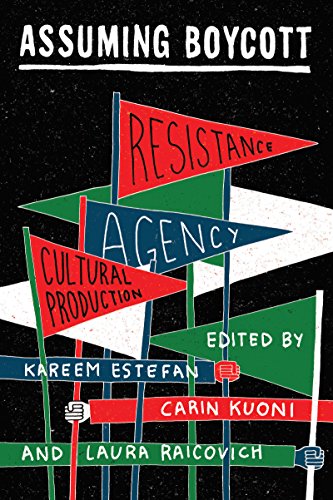Kareem Estefan, Carin Kuoni, Laura Raicovich (eds.): Assuming Boycott: Resistance, Agency, and Cultural Production (2017)
Filed under book | Tags: · activism, agency, apartheid, art, cultural production, cultural resistance, israel, palestine, politics, protest, resistance, south africa

“Boycott and divestment are essential tools for activists around the globe. Today’s organizers target museums, universities, corporations, and governments to curtail unethical sources of profit, discriminatory practices, or human rights violations. They leverage cultural production – and challenge its institutional supports – helping transform situations in the name of social justice.
The refusal to participate in an oppressive system has long been one of the most powerful weapons in the organizer’s arsenal. Since the days of the 19th century Irish land wars, when Irish tenant farmers defied the actions of Captain Charles Boycott and English landlords, “boycott” has been a method that’s shown its effectiveness time and again. In the 20th century, it notably played central roles in the liberation of India and South Africa and the struggle for civil rights in the U.S.: the 1955 Montgomery bus boycott is generally seen as a turning point in the movement against segregation.
Assuming Boycott is the essential reader for today’s creative leaders and cultural practitioners, including original contributions by artists, scholars, activists, critics, curators and writers who examine the historical precedent of South Africa; the current cultural boycott of Israel; freedom of speech and self-censorship; and long-distance activism. Far from withdrawal or cynicism, boycott emerges as a productive tool of creative and productive engagement.
Including essays by Nasser Abourahme, Ariella Azoulay, Tania Bruguera, Noura Erakat, Kareem Estefan, Mariam Ghani with Haig Aivazian, Nathan Gray and Ahmet Öğüt, Chelsea Haines, Sean Jacobs, Yazan Khalili, Carin Kuoni and Laura Raicovich, Svetlana Mintcheva, Naeem Mohaiemen, Hlonipha Mokoena, John Peffer, Joshua Simon, Ann Laura Stoler, Radhika Subramaniam, Eyal Weizman and Kareem Estefan, and Frank B. Wilderson III.”
Publisher OR Books, New York, 2017
ISBN 9781944869434, 1944869433
276 pages
Reviews: Rebecca Wolff (H-AMCA, 2018), Kim Jensen (Mondoweiss, 2017), Marguerite Dabaie (Electronic Intifada, 2017), Robert Bryan (Tribes, 2017).
Series of seminars (Vera List Center, 2015, with videos)
Book launch (New School, 2017, with video)
Ruth First (1997/2012)
Filed under book | Tags: · activism, africa, apartheid, biography, communism, democracy, journalism, politics, race, south africa

“The struggle to free South Africa from its apartheid shackles was long and complex. One of the many ways in which the apartheid regime maintained its stranglehold in South Africa was through controlling the freedom of speech and the flow of information, in an effort to silence the voices of those who opposed it. United by the ideals of freedom and equality, but also nuanced by a wide variety of persuasions, the ‘voices of liberation’ were many: African nationalists, communists, trade-unionists, pan-Africanists, English liberals, human rights activists, Christians, Hindus, Muslims and Jews, to name but a few.
The Voices of Liberation series ensures that the debates and values that shaped the liberation movement are not lost. The series offers a unique combination of biographical information with selections from original speeches and writings in each volume. By providing access to the thoughts and writings of some of the many men and women who fought for the dismantling of apartheid, this series invites the contemporary reader to engage directly with the rich history of the struggle for democracy.
This volume presents a brief biography of Ruth First, followed by a selection of her writings as a political activist, scholar and journalist. The book presents a timeline summary of significant events in Ruth’s life within the context of major socio-political events of the time. It concludes with a reflection on her legacy from a current perspective and offers a further reading list.”
Compiled by Don Pinnock
Publisher HSRC Press, Cape Town, 1997
Second edition, 2012
Voices of Liberation series, 2
Open access
ISBN 9780796923592
vii+182 pages
Commentary: Ruth First: lessons for a new generation of African scholars (Tebello Letsekha, DEP, 2014).
Ruth First Papers
PDF chapters (bibliography missing)
single PDF (complete)
Slavoj Žižek: Living in the End Times (2010)
Filed under book | Tags: · apartheid, biotechnology, capitalism, communism, ecology, financial crisis, genetics, intellectual property, philosophy, political economy

There should no longer be any doubt: global capitalism is fast approaching its terminal crisis. Slavoj Zizek has identified the four horsemen of this coming apocalypse: the worldwide ecological crisis; imbalances within the economic system; the biogenetic revolution; and exploding social divisions and ruptures. But, he asks, if the end of capitalism seems to many like the end of the world, how is it possible for Western society to face up to the end times? In a major new analysis of our global situation, Slavok Zizek argues that our collective responses to economic Armageddon correspond to the stages of grief: ideological denial, explosions of anger and attempts at bargaining, followed by depression and withdrawal.
After passing through this zero-point, we can begin to perceive the crisis as a chance for a new beginning. Or, as Mao Zedong put it, “There is great disorder under heaven, the situation is excellent.” Slavoj Zizek shows the cultural and political forms of these stages of ideological avoidance and political protest, from New Age obscurantism to violent religious fundamentalism. Concluding with a compelling argument for the return of a Marxian critique of political economy, Zizek also divines the wellsprings of a potentially communist culture—from literary utopias like Kafka’s community of mice to the collective of freak outcasts in the TV series Heroes.
Publisher Verso, 2010
ISBN 184467598X, 9781844675982
Length 416 pages
PDF (no OCR; updated on 2012-4-15)
Comment (0)
